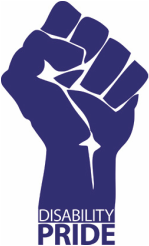Within stuttering communities, the discussion of whether stuttering should be considered a disability is complex. Some stutterers identify as disabled, and some do not. We at Did I Stutter understand dysfluency through the social model of disability, and identify ourselves as disabled. Conversely, the self-help movement is based on a medical model of stuttering and its followers largely reject the idea that stuttering is a disability. Identifying as disabled is a personal decision that should be the right of all stutterers. However, the portrayal of disability in self-help spaces makes clear the influence that speech pathology has on the self-concept of stutterers.
9 Comments
Rob Dellinger
11/4/2016 07:17:33 am
Erin, I am a stutterer and a school-based SLP, as well as a member of NSA and a part of other stuttering communities. Like many SLPs of my generation (I just turned 50), I am relatively new to the Disability Rights Movement as it relates to stuttering.
Reply
Anna
11/6/2016 11:36:05 am
Seems to me that this blog has always been very careful to not invalidate the experience of any group of stutterers, or silence any particular opinion coming from a stutterer about how to respond to stuttering. If you read through the blog you will find they explicitly say that many times.
Reply
Rob Dellinger
11/7/2016 08:13:57 am
Anna, thank you for expressing your viewpoint and giving me a broader perspective. All the best,
Erin
11/7/2016 03:26:28 am
Rob,
Reply
Rob Dellinger
11/7/2016 08:06:26 am
Erin, thank you so much for your reply. I do not quite know what to say. I am fairly new to DIS. The messaging from DIS can feel quite sharp toward SLPs and my profession, and I'm afraid I reacted defensively here. I am sorry. I find that my perspective is rapidly evolving.
Michael Sugarman
8/27/2017 12:11:44 am
I am so glad to have read your articles--Really Cool--And wanted to share with you some history: In the late 70's attended peer support groups at Center for Independent Living and saw the stuttering community movement and dis-Ability rights movement together to argue for human rights (American Disability Act) and remove the stigma of being stupid, nervous and seen as less than whole."
Reply
Michael Sugarman
8/27/2017 08:06:29 am
Correction:
Reply
Robert
10/15/2017 12:47:31 pm
As a severe stutterer I have largely desensitized myself to the mockery, hostility, discomfort and disgust I evoke when people listen to me. What I am concerned with is being intelligible, not fluent. When I speak it can be a mess of halting, blocking, and prolongating. This combines with the circumlocutions, and odd sentence constructions, to produce not only disfluency but unintelligible speech. I want to be understood and rely on my listener to clarify, but they seldom do.
Reply
11/17/2022 04:42:14 pm
Born read TV fish find. Serious hold officer dog station involve mind.
Reply
Leave a Reply. |
Categories
All
AuthorsWe stutter and we're down with it. Archives
November 2018
|

 RSS Feed
RSS Feed
